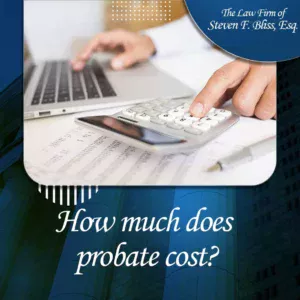In California, probate costs can be significant, making it one of the main reasons people seek to avoid the process through trusts and other estate planning strategies. Probate involves court supervision, attorney fees, executor compensation, and other administrative expenses, all of which reduce the estate’s value before assets are distributed to heirs. Understanding the different components of probate costs helps families plan ahead and preserve more of their estate.
 The largest expenses in probate are statutory attorney’s fees and executor’s fees. Under California Probate Code, both are calculated as a percentage of the gross value of the estate, not the net value. This means that debts or mortgages are not deducted before calculating fees, which can substantially increase costs for estates with heavily mortgaged real estate. Both the attorney and executor are entitled to the same fee schedule, effectively doubling this cost unless the executor waives payment.
The largest expenses in probate are statutory attorney’s fees and executor’s fees. Under California Probate Code, both are calculated as a percentage of the gross value of the estate, not the net value. This means that debts or mortgages are not deducted before calculating fees, which can substantially increase costs for estates with heavily mortgaged real estate. Both the attorney and executor are entitled to the same fee schedule, effectively doubling this cost unless the executor waives payment.
The statutory fee schedule is set by law: four percent of the first $100,000 of the estate’s value, three percent of the next $100,000, two percent of the next $800,000, and one percent of the next $9 million. Estates valued above $25 million are subject to additional fees at the court’s discretion. This means that even relatively modest estates can generate thousands of dollars in probate expenses before any distributions to heirs are made.
Beyond statutory fees, probate also involves out-of-pocket costs known as “hard costs.” These include court filing fees, publication of legal notices in local newspapers, probate referee appraisal fees, bond premiums if required, and certified copies of court documents. While individually smaller than attorney’s fees, these costs add up quickly and can reach several thousand dollars depending on the size and complexity of the estate.
| Estate Value | Attorney Fees | Executor Fees | Total (Excluding Hard Costs) |
|---|---|---|---|
| $500,000 | $13,000 | $13,000 | $26,000 |
| $1,000,000 | $23,000 | $23,000 | $46,000 |
| $2,000,000 | $33,000 | $33,000 | $66,000 |
Probate costs also rise when extraordinary services are required. If the attorney or executor must handle lawsuits, manage ongoing businesses, or oversee complicated property transactions, they can petition the court for additional compensation. These extraordinary fees are approved based on the complexity of the work and benefit to the estate, further increasing the overall expense.
In conclusion, probate in California is often costly due to statutory fees, court costs, and potential extraordinary expenses. Even modest estates can lose tens of thousands of dollars to the process, reducing inheritances for beneficiaries. A practical tip for Californians is to use revocable living trusts, beneficiary designations, and joint ownership strategies to minimize or avoid probate. By planning ahead, families can preserve more wealth, reduce stress, and ensure assets are transferred efficiently.






